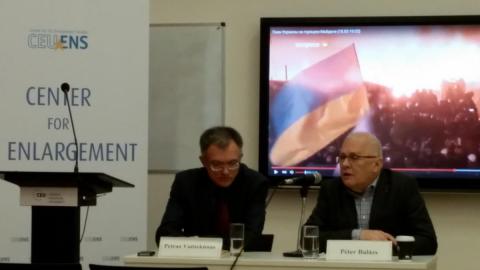Event report - "The War, the State and the Society in Current Ukraine: A View from Lithuania"

CEU’s Center for European Neighborhood Studies (CENS) and the Embassy of the Republic of Lithuania in Hungary hosted a public lecture “The War, the State and the Society in Current Ukraine: A View from Lithuania” on March 25, 2016. The lecture was delivered by Mr. Petras Vaitiekūnas, adviser to Secretary of the National Security and Defense Council of Ukraine and former Lithuanian Minister of Foreign Affairs.
Mr. Vaitiekūnas started his presentation by referring to the Russian Federation. There was a bipolar world during the cold war, but today we have a ‘monopolar’ world. Many Russians, including the Russian Foreign Minister Lavrov, believe that the place of Russia in this kind of world is not in Europe nor in Asia, but Russia should serve as a bridge between Europe and Asia. Russia also did not allow international actors (OSCE, NATO, EU) to be involved in the resolution of frozen conflicts (Transnistria, Ossetia), which means that the Moscow Kremlin is in a conflict not only regionally but internationally, too.
Mr. Vaitiekūnas further spoke about the EU and emphasized that the Union is strong economically, but not politically. “GDP does not win wars”, he said. The EU was unable to solve the serious problems in the last decade. One of them is Russia, which is a global threat nowadays. On the other hand, the EU is politically weak. Only 1% of the money is distributed through Brussels, while the rest of 99% is distributed through the EU capitals. The so-called ‘United States of Europe’ is not a real concept and the EU has to find a way to deal with other pressing issues such as Russia, globalization, Brexit, Ukrainian integration, migration. A western reaction to these problems should not be sanctions, but a revolution in our own thinking and in our defense policy.
In the second part of the speech, Mr. Vaitiekūnas spoke about Ukraine. He underlined that the biggest achievement of Ukraine is that it still withstands the Russian pressure. Ukrainian civil society started understanding that the only way to thrive is to carry out reforms, fight corruption, organized crime, and to improve education. What the EU needs is a new plan for Ukraine, but there is not political will to give financial support to Ukraine. “The future of EU is closely tied to the future of Ukraine”, he stated. He strongly believes that investing into Ukraine would be investing into EU’s security at the same time and that only Ukrainian success will be a success for Russia.
Finally, Mr. Vaitiekūnas drew two conclusions: first, to press Russia to cease fire in Donbas and second, to give free access to the OSCE in the same area.
The lecture was chaired by Péter Balázs, Director of CENS and former Hungarian Minister of Foreign Affairs. The lecture was followed by a lively question and answer session, touching upon a variety of issues: the current situation in Ukraine, upcoming NATO summit in Warsaw, Lithuanian support to Ukraine’s EU aspirations while under Janukovics, and many others.
